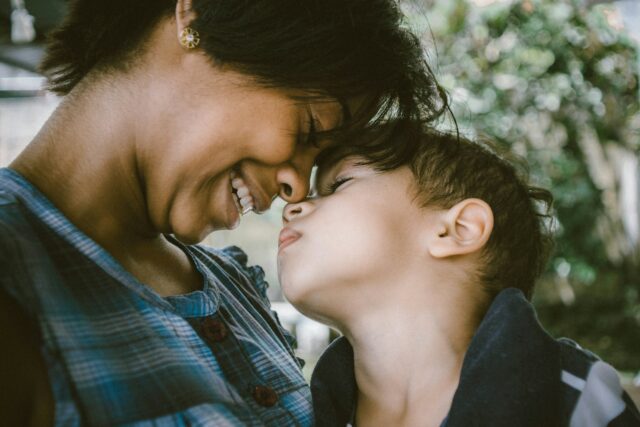When Joy and Grief Coexist
By: Shanni Tal, Psy.D. | August 22, 2025

Making Space for the Complex Emotions of Parenthood
This article is the second in our three-part series on maternal mental health. In the first article, ‘Who Am I Now?’, we explored the emotional identity shift of new motherhood and the profound changes – physical, emotional, and psychological, that accompany matrescence. Here, we’ll explore the complex reality that joy and grief often coexist in parenthood. Let’s face it: life with a new baby can be quite a rollercoaster – there are sweet moments of deep connection and happiness, alongside feelings of loss, self-doubt, and overwhelm. In this article, we’ll talk about why it’s so normal to feel all of these things at once, how you can navigate the ups and downs, and ways to invite compassion for yourself during this transition.
Navigating the Emotional Landscape of New Parenthood
- Emotional Growing Pains: Our bodies and minds are under acute distress when we bring a baby home. We’re learning how to care for a tiny little human who depends on us for everything, while trying to heal and meet our own needs. It’s no wonder stress is such a common part of the postpartum experience. Sleep deprivation, figuring out what your baby needs, and managing your own is exhausting. New parenthood can stir up anxiety, intrusive thoughts, and even emotional flashbacks -especially if you’ve experienced past trauma or loss. You might worry constantly, fear making a mistake, or feel emotionally raw. These feelings are not only common and valid; they also deserve to be met without shame. Practicing compassionate self-talk and being gentle with yourself, especially during stressful moments, can help you to avoid some of the common thinking traps listed below that can make things feel even heavier.
- Bonding with Your Baby: You might feel an instant connection with your baby – or you might not. Both are completely normal. Attachment is a process, not a switch that flips ‘on’ or ‘off’. Many new parents worry if they’re bonding the “right” way or fast enough. It’s natural to feel a kind of healthy hyper-attunement to your baby’s needs, but that heightened state can sometimes make you feel like you’re losing yourself. In reality, a bond forms over time – through daily care, small moments of presence, and showing up again and again. If you’d like more hands-on guidance to strengthen your connection, consider working with a provider that specializes in attachment and parent-infant therapies.
- Adjusting to a New Role: Imposter syndrome doesn’t end with your career; it can creep into parenting, too. You may find yourself wondering, “Am I doing this right?” If you’re asking that question, it’s a sign you’re already tuned in – and that’s what good parenting looks like. No matter how many books you’ve read or how much advice you’ve gathered, the learning curve is steep. Feeding, burping, swaddling, soothing, diapering -it’s a crash course in caregiving. Feeling clumsy or overwhelmed at first isn’t a reflection of your worth; it’s simply part of the journey. Most of us carry an internal blueprint of what parenthood “should” look like. When reality doesn’t match that vision, feelings of disappointment, guilt, or self-doubt can arise. That gap doesn’t mean you’ve failed -it means you’re human.
- Mood: It’s estimated that 15–21% of women experience moderate to severe postpartum anxiety or mood disorder. Perinatal Mood and Anxiety Disorders (PMADs) can affect anyone and may show up in different ways. For some women, symptoms include obsessive preoccupations about the baby’s safety, suicidal thoughts, or a loss of interest or enjoyment in the things they once loved. If you find yourself thinking, “This isn’t me,” it could be a sign that a PMAD is present. The good news is that most PMADs are treatable with the right support and care. Connecting with a perinatal psychotherapist and a reproductive psychiatrist are good first steps toward feeling like yourself again.
- Grieving the Adjustment: Some moms feel grief for the life they had before – and that’s okay. Missing your old self doesn’t mean you love your baby any less. It means you’re simply adjusting to a new version of yourself, and that takes time. Even if you love being a mom, it’s natural to mourn the freedom, spontaneity, or sense of control you once had. In new parenthood, shifts are inevitable – from old routines to a new reality, from career goals to recognizing your current capacity, from independence to caring for a baby who needs you 24/7, from your past self to the person you’re becoming. Instead of judging yourself, try noticing your feelings like a compassionate observer. “I miss my old self” doesn’t mean you regret your baby – it means you’re human, and you’re adjusting. You’re allowed to hold both joy and grief at the same time.
- Inner Child: Motherhood often brings us face-to-face with the emotional fingerprints left by our own childhood – those invisible marks that shape our identity, behaviors, and relationships as adults. Becoming a parent can stir memories of how we were parented, sometimes in unexpected ways. Maybe you had a distant, overbearing, or critical parent, and now you wonder, “Will I be like them?” Old wounds can reemerge and your baby’s needs may unconsciously remind you of your own unmet needs growing up. You may want to ask yourself, “What does it mean for me to be a mother?” You have the power to redefine that for yourself – in a way that aligns with your values, your hopes, and the kind of connection you want to create with your child.
- Identity: In the early days, you might feel like a stranger in your own life. That’s because motherhood doesn’t just add something new – it reorganizes everything. Over time, as you and your baby grow together, this state begins to soften. Little by little, you start to find space for your whole self again – not just the “mom” part, but the woman, the partner, the friend, the creative soul you’ve always been.
If you’re feeling a mix of emotions in new parenthood such as gratitude and joy alongside grief, and exhaustion, know that you are not alone. These experiences are a natural part of the transition and do not diminish the love you have for your baby. At Therapy Changes, we understand the complex and often conflicting emotions that can surface during this time. Our compassionate and skilled team of talented therapists are here to walk alongside you, helping you make sense of the rollercoaster of emotions, navigate the process, and work to find some semblance of balance in your life. Contact us today to get started.
In the third and final article of our maternal mental health series, we’ll explore the ways relationships and roles shift after your baby arrives, and how to nurture connection with your partner, loved ones, and most importantly, yourself.
Photo by Bruno Nascimento on Unsplash



